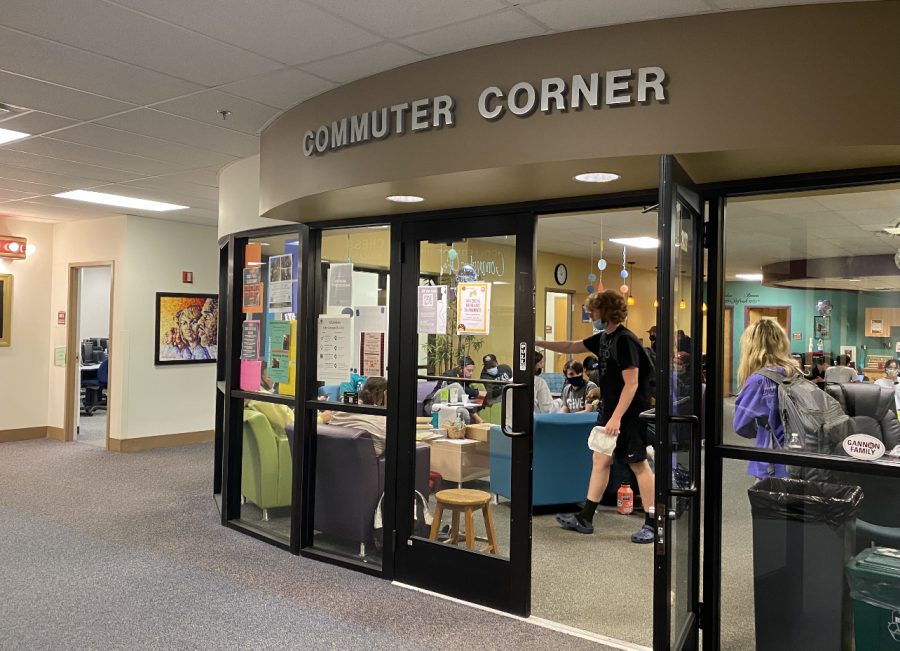The commuter experience changes this year
Commuters are more included with less COVID-19 restrictions
October 5, 2021
There is no doubt that COVID-19 has caused the world to change, and it continues to do so. Along with the many changes occurring worldwide, COVID-19 has changed the college experience, especially for commuters.
Back at the beginning of the fall 2020 semester, Gannon introduced new COVID-19-related rules and regulations, especially concerning commuter students and how they were allowed to be interconnected with the rest of the student body (or not allowed, to be more precise).
While the commuter experience can be much different from that of a resident student even during a normal year, commuter students quickly learned that obtaining a normal college experience with COVID-19 regulations imposed on them was nearly impossible.
One of the main regulations that impacted the college experience for commuters was the rule that commuters were not allowed in residential dorms, said Kimberly Reisinger, a sophomore physician assistant major. However, with the lifting of many of these rules, Reisinger said that this year she started to feel more connected with her classmates.
“Last year I struggled to make friends because we sat so far apart in class and we were not even allowed in the dorms,” Reisinger said. “This year I have already met so many people by participating in classes and activities in person.”
Mario Bruni, a sophomore digital media communications major, also said that being a commuter was difficult last year due to harsh COVID-19 restrictions.
“It felt like there was distance between residents and commuters last year,” Bruni said. “This was due to the restrictions of not allowing commuters into residential buildings.”
Bruni also said that it feels much different as a commuter than it did last year.
“I also felt like some days being a commuter, I was only going to school,” Bruni said.
“There were really no events or activities going on around campus. Now you look at this year, and it seems that none of that is existent.”
Heidi Noyes, director of Commuter Life, said that now that many COVID-19 restrictions have been lifted, there is little difference between the experiences of residents and commuters.
“With things opening up a bit more on campus, all students have a similart experience,” Noyes said.
Mikel-Bryan Ott, a junior accounting and sport management major, said that his experience this year as a commuter is better than last year because there are more in-person classes and events.
“Last year most events were virtual, and the Commuter Corner had to limit the amount of people due to social distancing,” Ott said. “Now, it’s almost like it’s my first semester in 2019 again.”
Trevor Kubeja, a sophomore journalism communication major, said that being a commuter requires spending less time on campus, which also makes it more difficult to meet people.
“The main difference is the fact that you come and go from campus and so there are times where you may not feel as connected because you just aren’t spending as much time on campus as someone who lives there,” Kubeja said.
One way to feel more connected despite this is to get involved in different clubs and organizations on campus, Kubeja said.
“Clubs can be a great way for commuters to meet people, as well as the Commuter Corner,” Kubeja said. “In the communications department alone, there are plenty of opportunities such as The Knight and WERG.”
Reisinger also emphasized the importance of getting involved on campus as a commuter. One of her favorite ways to do this is through the Commuter Corner.
“In the Commuter Corner, people are very friendly and welcoming,” Reisinger said. “There are always people to hang around and talk to.”
Ott also said that the Commuter Corner is a great resource to utilize to meet people.
He also stressed how important it is to reach out and make connections with other people.
“Be involved on campus, join groups, go to events, study with people from your classes,” Ott said. “Just do anything that involves other people.”
Reisinger also said that the experience of a commuter is different from that of a resident because of the relationship between them and their families.
“We are still very tied to our families and lives before college,” Reisinger said. “But the biggest advantages to commuting are getting to stay in a comfortable home each night and having home-cooked meals.”
Commuters also must account for inconveniences that may come with travel, Reisinger said.
“We must manage our time to consider how long our commute is,” Reisinger said.
“I personally have a long commute, so I must plan my study time and personal life around that. I also need to plan according to traffic and road conditions so I can make it to class on time.”
Ott also said that there are more inconveniences that come with being a commuter.
“Being a commuter sometimes makes it difficult to take advantage of the resources provided to students,” Ott said. “It’s extra stressful having to travel so far to get help in your free time.”
However, Noyes said that the overall college experience is not detracted from by commuting.
“I always tell commuters that they can do whatever a resident can do except use their ID to get into a residence hall,” Noyes said
ANNA MALESIEWSKI
[email protected]





